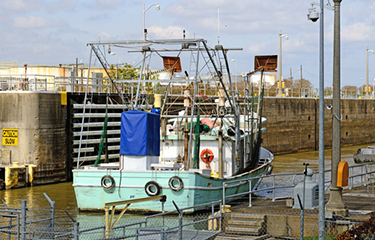The U.S. Department of Commerce has determined multiple fisheries in the U.S. states of Louisiana and Mississippi suffered from disasters in 2020, clearing the way for those state to receive financial assistance from the federal government.
“Sustainable fisheries are vital to our nation’s ocean economy and fishery disasters directly harm our local communities when they occur,” Secretary of Commerce Gina Raimondo said. “These disaster determinations allow us to get fishing communities in the Gulf of Mexico the financial assistance they need to mitigate impacts of disasters, restore fisheries, and help prevent future disasters.”
According to the government, the Mississippi shrimp and oyster fisheries, as well as the Louisiana saltwater finfish, oyster, and shrimp fisheries, were subject to a disaster.
Louisiana Governor John Edwards requested disaster assistance in 2020 in response to Hurricane Laura, which impacted thousands of fishermen and dealers.
“Fishing communities suffered devastating infrastructure damage to docks and boating facilities; lost gear and vessels; lost housing; loss of stored product,” Edwards explained to NOAA in his request. “These communities face uncertain futures as they try to get back to work and recover.”
NOAA Fisheries updated its seafood reporting requirements in the hurricane’s immediate aftermath, declaring that “catastrophic conditions” existed in several Texas counties and Louisiana parishes in the storm’s path.
For Mississippi, the disaster determination is a response to historical flooding in the lower Mississippi River Valley in 2019, with the torrent of freshwater harming and displacing saltwater species. The Department of Commerce declared a “catastrophic regional fisheries disaster” in 2019 to provide immediate support to fishermen in the affected states, with Louisiana receiving USD 58 million (EUR 53 million), Mississippi receiving USD 21 million (EUR 12 million), and Alabama receiving USD 8.6 million (EUR 7.9 million).
However, Mississippi’s commercial shrimp and oyster fisheries experienced long-term impacts that lasted beyond 2019, according to Mississippi Governor Tate Reeves. The Mississippi Department of Marine Resources reported 97 percent oyster mortality from the flooding, predicting that the commercial harvest would be on hold until 2023 at the earliest. The department estimated USD 8 million (EUR 7.3 million) in lost oyster revenue.
Mississippi also reported an 85-percent reduction in brown shrimp abundance in the Mississippi Sound in 2019, with revenue dropping to USD 3.7 million (EUR 3.3 million) – just 51 percent of the five-year average.
Mississippi and Louisiana were last awarded funding for Mississippi River flooding in 2012.
The latest fishery disaster assistance will come out of funding already appropriated by U.S. congress for the purpose. The determination also clears the way for impacted businesses to apply for loans through federal relief programs.
Louisiana has also asked NOAA Fisheries to declare a disaster in response to Hurricane Ida in 2021, although no determination has been made by the federal government. In its submission requesting federal assistance in September 2021, the state government claimed that docks were still underwater, 30 percent of the shrimp boat fleet was gone, and other infrastructure blown away.
“Our industry has endured many storms, pandemics, and the BP oil spill, but nothing that has wiped out the infrastructure of our fishing communities such as this,” Lieutenant Governor Billy Nungesser wrote Raimondo. “We will survive this, but need the proper assistance and adequate funding to keep our fisherman [sic] on the water, repair boats, and get docks back to working order.”
A 2022 report released by Louisiana Sea Grant and the Louisiana Department of Wildlife and Fisheries estimated that the four hurricanes that hit the state since 2020 have cost the seafood industry USD 580 million (EUR 521 million).
Last month, the Department of Commerce allocated USD 220 million (EUR 204 million) in relief to the U.S. states of Washington and Alaska for a variety of fishery disasters that occurred between 2020 and 2023.
Photo courtesy of Shutterstock / TFoxFoto







